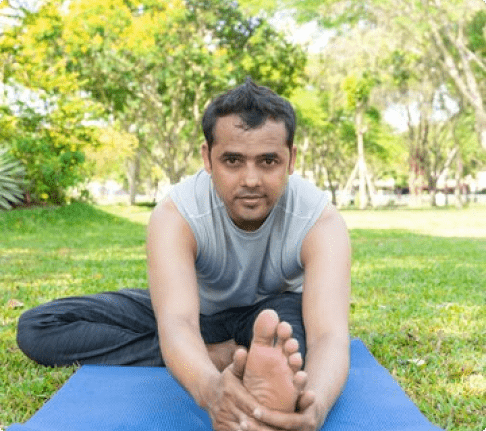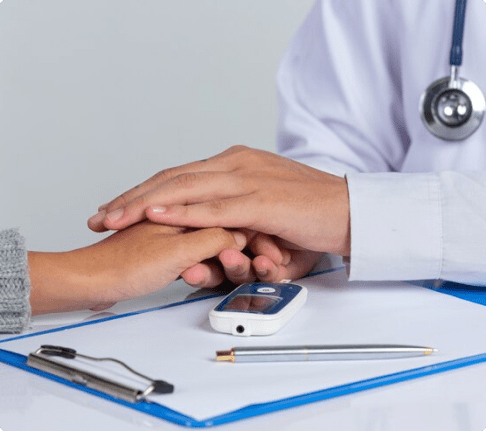- Visiting Hours: Mon-Sat / 8:00 AM - 8:00 PM
- Visiting Hours: Mon-Sat / 8:00 AM - 8:00 PM
In individuals without diabetes, the typical fasting blood sugar levels are below 90 mg/dL. For those with diabetes, random blood sugar must be optimally kept in the range of 80-130 mg/dL, and post-prandial sugar levels (tested two hours after a meal) should not exceed 180 mg/dL or a maximum of 200 mg/dL.
Maintaining a healthy diet, engaging in regular exercise, maintaining an optimal body weight, and reducing screen time with devices, can significantly reduce the chances of getting diabetes. Other vital modifications are having balanced meals low on carbohydrates and avoiding junk food, soda, alcohol, and smoking. Adequate and sound sleep and keeping stress levels down with hobbies, meditation, or other methods can help, too.





Diabetes can cause a variety of health complications, such as gum disease, high/ low blood sugar, leading to fainting spells, and cardiac problems, including a higher risk for stroke and high blood pressure. It can also cause damage to the kidneys and nerves and increase the risk of infections and skin problems. Individuals with a long-term diagnosis can develop foot problems such as poor blood flow and tingling and eye issues such as retinopathy.
Some people who take insulin may gain weight, but not all. Insulin promotes the storage of glucose in cells, and the glucose is converted to fat and stored in our tissues. This can cause weight gain. Different types of insulin have different effects. Slow-releasing insulin does not contribute to weight gain, but rapidly acting formulations can lead to weight gain. Individual susceptibility and lifestyle choices are also contributing factors. However, any potential weight gain from insulin therapy can be typically managed.



The best and safest way to manage weight with diabetes is to maintain a balanced diet and consistent outdoor exercise regimen that includes running, swimming, cycling, etc. Alternating daily exercise regimens and the muscle groups you work out is essential. Avoid activities that strain the body excessively, considering your age and weight, and never take statins or diet pills without consulting your doctor.
Living with diabetes can be challenging, especially in managing the financial, well being and medical aspects. But it is crucial to stay positive.
The most significant changes to make are managing stress, reducing screen time, eating healthy, and being active. Set realistic goals for weight loss, and seek help from professionals and the support of friends and family. Educate yourself about the disease to tackle your fear effectively. Also, actively consult with your healthcare providers on any symptoms or other issues related to the disease and your physical and mental health.





Individuals with diabetes, as far as possible, must avoid sugar-rich foods. However, based on the type of the disease and its progression, it may not be necessary to avoid all carbohydrates. The key is balance and moderation. Natural sugars in fruits and vegetables usually come with beneficial nutrients and fibre, while processed sugars added to food and aerated drinks are more harmful and harder to process.
Type 1 diabetes is an autoimmune disease wherein the body fails to produce enough insulin. It is typically seen in adolescence or early life and is a lifelong disease that requires insulin to be externally supplied to the body.
Type 2 diabetes is a metabolic disorder caused by the body developing insulin resistance. Its onset is typically seen in middle age and is associated with poor lifestyle habits. Diagnostic and treatment methods for both disease types overlap. However, management of Type 2 diabetes focuses on healthy living; individuals can go into remission with a proper diet and exercise, unlike Type 1 diabetes.



Having one or both parents with a diagnosis of diabetes could sometimes increase the risk of getting the disease. There is a genetic predisposition for getting diabetes, but a family history doesn’t guarantee you will get it. If you have a parent with diabetes, then regular testing and being conscious of diet and lifestyle habits can help prevent the disease or, if you do get it, efficiently manage it.
Maintaining low blood sugar levels is key for managing diabetes. Non-starchy vegetables like spinach, broccoli, legumes, whole grains, fruits, protein-rich food, healthy fats, nuts, and herbs are all great diet choices for those with diabetes. It is essential to get a balanced diet and eat a variety of foods. Some good food options to manage diabetes effectively are brown rice, fish, berries, apples, oranges, dal and lentils, beans, peas, and cooking with gingelly or olive oil instead of unhealthy saturated oils.




Prevention is always better than cure. We perform routine physical and wellness check-ups to ensure that any disease is detected and treated in its initial stages.



The standard tests taken for a diabetes diagnosis are blood tests. Blood tests can check for different parameters based on when they are taken and what they are testing for. Commonly, the blood sugar level is checked, which can be random, after food, before food, or a combination of these. The HbA1C test checks for the amount of haemoglobin in the blood that has absorbed glucose and is the best indicator for assessing the long-term average blood sugar level. Early detection can reverse diabetes.



Would you like to manage your diabetes better and lead a healthier, normal life?
Take an appointment with our senior diabetologist today!